

|
|
Empty Nest Magazine
|
Real People Empty Nesting James D. Porterfield: Marketer, Teacher, Railroad Aficionado, Dad By Robin Bonner For a man who once swore he’d never have kids, Jim Porterfield has become one busy dad—fitting grown-family activities around his writing projects, teaching gigs, research, and railfan appearances, which take him all over the country. Can you say “Type A”? To hear Jim speak is to know what is meant by “drinking from the fire hose.” You can barely process the information, let alone respond, before he’s on to a different and even more in-depth subject. His range of knowledge is astounding, the “conversation” at once exhilarating and exhausting. The man barely sleeps and gets more done in a day than most people do in a month. When I first met Jim, he was an acquisitions editor with a Philadelphia-based college textbook publishing company. A former high-school history teacher interested in marketing, he knew a great deal about how to motivate salespeople and convince authors to sign book contracts. Recently divorced, he said he’d never have children.
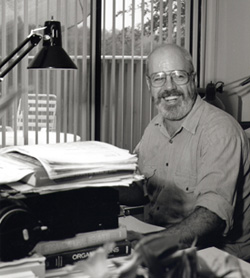
Experiencing the thrill of having finished Dining by Rail. (Photo by David Flores)
Jim’s career has proved equally adventurous. He has a diverse background in publishing, entertainment, and advertising, as well as marketing consulting with computer, electronics, insurance, and manufacturing firms, for which he develops marketing plans, reviews grant proposals, and creates program content. He teaches marketing, writes books, and sells insurance, but his passion is all things railroad. Jim published the popular Dining by Rail (St. Martin’s Press) and made guest appearances at Philadelphia’s Book and the Cook events. He is a contributing editor of Railfan & Railroad Magazine, for which he authors "On the Menu," a monthly column about rail dining, and writes features on railroad artists and historic sites. He’s also circle leader for the Gozaic website Journeys for a Railroad Tourist, a service of Heritage Travel and an affiliate of the National Trust for Historic Preservation. Jim has appeared on the TV Food Network and WPSU (Penn State’s PBS TV affiliate) as well as other local and regional programs, giving interviews and doing cooking demonstrations. In addition, he’s been interviewed by Terry Gross on Fresh Air and has been a guest on Let's Talk Travel with AAA, hosted by Sandy Fenton. He is currently helping to organize events to attract tourists to the railroad industry—including jazz rail journeys—and is managing another website: The Railroad Tourist: A State-by-State Guide. Despite Jim’s range of interests and the multiple facets of his career, however, talk to him for 10 minutes and his three kids will find their way into the conversation. We asked Jim to share some of his musings about raising kids, especially under challenging circumstances; how to merge family and career when you’re in the thick of both; and how best to survive the empty-nesting years. EN: Jim, you began your early career as a high-school history teacher—what attracted you to that field and what drew you away from it? JP: I’ve loved history ever since I was a child. Part of my memory of growing up in Edinboro, PA, was reading works of nonfiction from a Book-of-the-Month Club children’s subsidiary in the 1950s, when my classmates were reading comic books. I’d enrolled at Edinboro State Teachers College, intending to transfer to the University of Pittsburgh’s School of Pharmacy, but a semester of organic chemistry induced me to reconsider. One reason I’d done badly in the course was that I spent too much time continuing to read history and current events. So I decided to pursue my passion and switched majors to social sciences education (it was, after all, a “teachers” college), with no clear ambition beyond college. I did have to student-teach to graduate, however, and I enjoyed the experience. Job opportunities for social studies graduates who did not coach a sport, though, were few and far between. I nonetheless secured a position at a large suburban high school near Pittsburgh and was told later by my curriculum coordinator that he was impressed when I answered the first part of your question thus: “It is one of the few jobs that pay you to read.” My “A” in student teaching probably helped. And I even got a coaching job! It was for the school’s debate team, as that’s where my competitive energy had been expended in college.
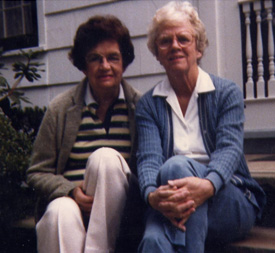
Aunt Eleanore (right) and her companion Dorothy Roberts, educators with a national reputation. These two women most influenced Jim's intellectual development. "They each achieved renown, overcame hardships, and molded at least one rambunctious kid into a responsible adult, teacher, and father." Like many teachers, before the army I had never had an “other side of the desk” experience. I’d been inducted after I was 26 years of age. My MOS (military occupational specialty) after training required that I be assigned to a combat unit. As a result, because of a shortage of officers in Europe, I was appointed my infantry battalion’s unit readiness officer (I was only an E-2 private, and the position called for a captain), a position for which I later received an Army Commendation Medal. The experience also gave me the confidence to try something else. After a few false starts, I wound up in the publishing industry, where I’ve held positions in sales, in marketing, in acquisitions, as an agent, and now as an author. EN: What eventually made you decide to have a family? How did you end up in State College, PA, and how did you and your wife manage when the kids were young? JP: The decision to start a family sprang from two considerations. To understand the primary motivation, you have to know that the Porterfields are a very old family, traceable to the 1100s, and perhaps before. (No verifiable earlier written records exist, I am told.) As I entered my 30s, my attitude toward fathering children became a subject for discussion in my branch of the family. My grandmother, Blanche Porterfield, even noted in her autobiography that it appeared our bloodline would perish with me. I’d already been married once and showed no signs of starting a family. When I attended my grandmother’s 90th birthday party, though, and realized I was the youngest one there, something told me I should reconsider. And as schmaltzy as it sounds, it wasn’t long after that party, while working in New York City for a division of Prentice-Hall, that I met someone who then struck me as a wonderful woman and loving mother; she’d just given birth to her daughter, only to have the father fall prey to drug abuse. We were both looking for a stable future and settled home life. A 6-month courtship led to marriage, my adoption of her daughter, and, eventually, a move to State College—the tranquility there is captured by its nickname, “Happy Valley”—where I found a position with the Penn State Press. Our move to State College was seemingly well thought out. We’d visited the community twice. It is a small city nestled in a bucolic setting. The public school system is considered superior. And if you don’t live “downtown,” in the center of student housing, it lends itself to peaceful pursuits amid an environment that supports and encourages creativity. We both went to work for the university, she as an admissions clerk and I as an acquiring editor. Our son was born just before we moved, and our second daughter was born 3 years later. Quality daycare is one benefit of living in the shadow of a large university, and that’s where the children were placed before entering public school. Another positive outcome of the move was that our children grew up in a safe and supportive environment. Being home to a large university, State College itself has a diverse population and extensive educational opportunities, including school programs and course offerings, as well as extracurricular activities. We took advantage of these, placing each child in a school system touted as "private school education in a public school" and eventually in college there (although not all of our kids attended Penn State). The move, however, turned out to be a major contributor to the eventual collapse of the marriage. My wife was from Costa Rica. She came to the United States, to New York City, when she was 9 years old. Central Pennsylvania is overwhelmingly white, and although the University community tries to be inclusive and State College itself has some diversity, the culture shock—affecting everything from the lack of ethnic hair care products to a feeling of social isolation—was difficult for her to overcome. Furthermore, although she'd held a responsible supervisory position with a Fortune 500 company in New York, she did not yet have a college degree. In a college town, especially one with a large number of highly educated "captive spouses" seeking work, she had to settle for an entry-level clerical position. Finally, the absence of a vibrant multicultural atmosphere and social life, such as that found in New York City, proved a major stumbling block. The difficulties between us grew insurmountable, so we divorced after 13 years of marriage. EN: What challenges did you face when you and your wife split? How did you come to have custody of the children? JP: When it was clear the marriage had become destructive to both my wife and me, and, in turn, to the children, we agreed to separate and divorced 2 years later. I was awarded custody. My initial thought was that it would be in the children's best interest—certainly financially—for them to live with their mother, freeing me to resume my career as a marketing executive in publishing. Time has shown the custody decision to be the correct one, though, and I don't for a minute regret that I was charged with raising these children alone. After the marriage dissolved, I relied heavily on the childcare services available in State College. My children were just 5, 9, and 13 when my wife and I separated. On top of that, I'd had to assume a much heavier teaching load to increase my income. The days were hectic, beginning with dropping off the youngest two at a preschool program at 7:30 a.m. so I could reach my first class at 8:00 a.m., then picking them up at 5:30 p.m. to get them home to a sitter and racing back to campus for a 6:00 p.m. class. The children had adjusted to the increasing absence of their mother during the time leading up to the divorce, as she had taken to returning to New York frequently. My older daughter was a great help, especially with her younger sister. Broken families, though, are not uncommon today. When my son asked me if he could tell his friends about our plan to divorce, it occurred to me that three of the four fellows he had in mind to tell were themselves living with a single parent or in a blended family. So, I saw this as something we could get through as well. The most heart-wrenching moment, which told me that despite appearances the separation was painful for them, was when I discovered my 5-year-old standing in my bathroom one morning. When I asked her what she was doing, she said, “I’m trying to smell mom.” Once all three were in school, I had to impose on each of them a limit of three extracurricular activities so I could keep up with their comings and goings. To the best of my knowledge, that worked (at least they haven't told me otherwise). It became clear early on that, as a single parent, you had to pick your fights carefully. With three children revealing a widely varying set of interests, abilities—I have an entertainer, a physical fitness advocate, and a genuine geek—and sensitivities, it was for me to learn what worked with each one. My older daughter is a born leader, with a well-developed sense of right and wrong. Her younger sister says she thinks of her as her mother, someone she could go to for help with anything. My son began work as a grill cook at Dairy Queen at age 15 and excelled at it, so he looked forward to going to work. The youngest was unusual for her interest in science and math. Like most youngsters, she fell in with a clique, but in her case it was a group of four girls, all of whom took school seriously and excelled at their studies. One thing I implemented was a summer vacation at the beach, something I have fond memories of from my childhood but that my then-wife did not want to do. The first summer of our separation, I began taking the children to a fantastic cozy A-frame cottage with a private beach I’d found on Lake Delton in the Wisconsin Dells. The first time we went overnight by train in a sleeping car, so the children could experience what I did over the summer (my writing had resulted in my serving as a host/lecturer on board the American Orient Express for three trips every summer). We swam, often at night, went cycling, did jigsaw puzzles and played games, and took in many of the activities associated with the Dells. That included a day each summer at Noah’s Ark, reportedly the world’s largest water park. I’m proud to say that, despite my age, I not only could keep up with them throughout but also could tackle the scariest new rides each summer before they would try them. EN: How, as a single father, have you dealt with life as your kids have approached adulthood? Any special scenes come to mind? JP: With the children, I’ve been pretty much “hands off.” Although she may not have meant it for these circumstances, my dear, departed Aunt Eleanore, who had a profound influence on me while I was growing up, had as a favorite expression, “That sounds like an opinion. If I’d wanted your opinion, I’d have asked for it.” Thus trained, I seldom, except perhaps in the matter of the amount of time my son spent playing computer games, tried to force my will on any of them. In retrospect, it helped greatly that each of them had a strong sense of self and of personal interests. As an extension of my "pick your fights" mentality, I always saw it as my role to provide a roof over the family's head, keep food on the table and everyone clothed, and support them in the pursuit of their passions—as impulsive and temporary as some of them might seem—and also to be there when they needed help. I’ve tried to adopt the attitude of a coach, posing questions and using the answers to introduce my point of view. This I usually followed with “But you do what you think is best” and letting them make their own decisions.
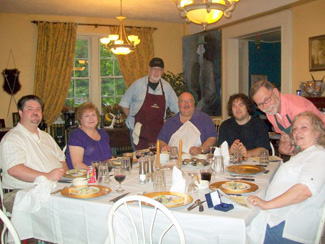
Memorial Day weekend 2010, at the Elkhorn Inn in Landgraff, WV: The first "Annual Dueling Dining Car Chef's Cook-Off." Chef and inn co-owner Dan Clark, also standing (at right), and Jim secretly worked together each evening to offer authentic railroad-themed dinners to guests. Elisse Clark, the promotion-minded other owner, was responsible for the overly enthusiastic title. (Although a great collector of railroad recipes, Jim has never actually earned the designation of "chef," and if he commented on any work he's done in a dining car kitchen, he'd probably be confessing to a violation of Federal Railroad Administration regulations.)
Although the two oldest children are now out of the house, my youngest is still at home, completing her college education at Penn State. Now, however, we are more like roommates. She has her own schedule, a social life built around classmates, and her boyfriend, and—I still have to remind myself—other concerns common for a young woman. Last Christmas, for the first time, my circumstance plucked at nostalgia. I was lying on the sofa, reading, occasionally looking past the decorated Christmas tree at snow falling outside the sliding glass door. It occurred to me that I had only 1 or 2 more years of this scene coming—that in a few years all four of us will have gone our separate ways. It was not with indifference that I mused how I had created and enjoyed this scene for 14 years. I know I will miss it. Even if we are able to get together for Christmas in the future, it will be somewhere else, and odds are it will never again consist of all four of us. EN: Give us a snapshot of your kids. What are they like? What are they up to? JP: I have been blessed with three wonderful children who have grown into adults that would make any parent proud. My older daughter, now 28, is an NCO in the U.S. Air Force and in the midst of her second deployment to Afghanistan. She also happens to be a skilled singer and dancer, having won numerous awards for her performances in middle school and high school. A songwriter as well, she has several recordings on iTunes (under the name Znai). She is earning a degree in music production management and plans to pursue a career in music when she completes her Air Force enlistment (she's currently on her second).
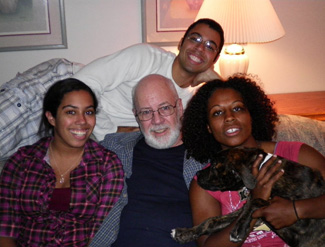
"The sum of my efforts, and my contribution to the future of America, if not of mankind. Taken in July 2010, we were preparing for my oldest daughter's first deployment to Afghanistan." My youngest daughter, age 22, has grown up with me and has lived at home more years than her siblings. Because of that, and because she is the one who looks out for me most directly, she has earned the nickname "The 3rd Mrs. Porterfield." She has long had an interest in and is pursuing a career in astronomy. As a result, she is enrolled in what many consider to be Penn State's toughest major: astronomy and astrophysics. She also works for NASA as a researcher for the Swift satellite, helping to track and record the results of gamma ray bursts in the universe (don't ask me for a further explanation). I consider myself fortunate. I’ve never been called to school for a parent conference. (Well, OK, my youngest did, while in kindergarten, mind you, tell her Principal to “go to hell” when she had been sent to the office to calm down. I asked the Principal what she did, and she replied, “I grabbed the secretary and we ran down the hall as fast as we could before we broke out laughing.” I assured her that the child had not learned that expression at home, but that if she’d said “Motherf*#ker, she might have gotten that from me.) The police have never had to call or visit. (Again, with one exception: My older daughter had once scored highest in her class on a summer cadet academy program, including a remarkable target with six of eight shots on the bull’s eye. I was notified of the award.). Report cards were always acceptable, if at times disappointing. No drinking, no drugs, no discipline problems. I take no credit for that. It is to their credit that they have grown up with a strong sense of right and wrong, with clear and level heads, and with bright prospects for the future (if our economy ever grows again). EN: What are your plans for the future? Where do you see yourself in 5 years, regarding career, location, and your kids? JP: More and more I find my attention turning to my interest in railroad history, travel, and preservation, and to writing about it. 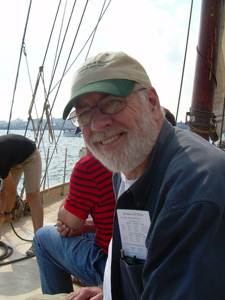
On board a sailing excursion on Casco Bay in Portland, ME, in 2010.
I'm assuming my children will scatter. My older daughter either will make a career out of the Air Force or will live in some large city, pursuing a career in music. With my son having his eye on the Secret Service, the FBI, or the state police, his location, too, will be subject to change. And my younger daughter—having learned she is already too old to be considered for flights to Mars—believes she will wind up working in the West or Southwest, where the aerospace industry tends to locate. I'm not sure how often we will be in close touch. With today's technology, that does not mean we will be out of touch. On my Macintosh I was able to watch my older daughter sing in her church choir every Sunday while she was stationed in Okinawa, and we see each other via Skype while she's in Afghanistan. And if my health should fail? Well, I have both long-term care insurance and a copy of Final Exit to ensure I will not be a burden to my children. EN: What advice do you have for families entering their empty-nesting years? JP: For the parents, stay active. Pursue an encore career. Volunteer to better your community, profession, or interest group. I'm convinced that remaining involved, pursuing a passion, making a meaningful contribution, and continuing to advance your knowledge are among the keys to healthy longevity. 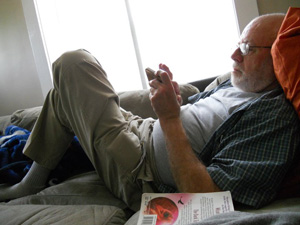
Caught playing Angry Birds in June 2011. Apparently, the sight of Jim relaxing while doing something not related to trains was enough to send one of his children running for a camera. Beyond that, I am concerned about what life holds for my children. It seems to me they will have to be flexible in their pursuit of work and will face periods of unemployment as the world's economies morph continuously and increasingly rapidly; I have no confidence in forecasting accurately where they will be in 5 or 10 years. In contemplating the building of a new house when I finally realize my dream of moving to West Virginia, I have selected a floor plan that includes a studio apartment. Once known as a "mother-in-law unit," I believe in the future it will become an "offspring dwelling" for those times when it may be necessary for a child adrift to have a place to regroup. And, speaking of longevity, I have been warned by the third Mrs. Porterfield that I have to be present when she starts her family. Because I started my family late—in my mid 40s—and because her mother's parents lived outside the United States, she did not know her grandparents. It is touching to me that she does not want her children to have the same experience. And like my grandmother, she has a way of pressing her point.
Robin Bonner is editor of Empty Nest. For more about Robin, see About Us. |
Empty Nest: A Magazine for Mature Families
© 2011 Spring Mount Communications